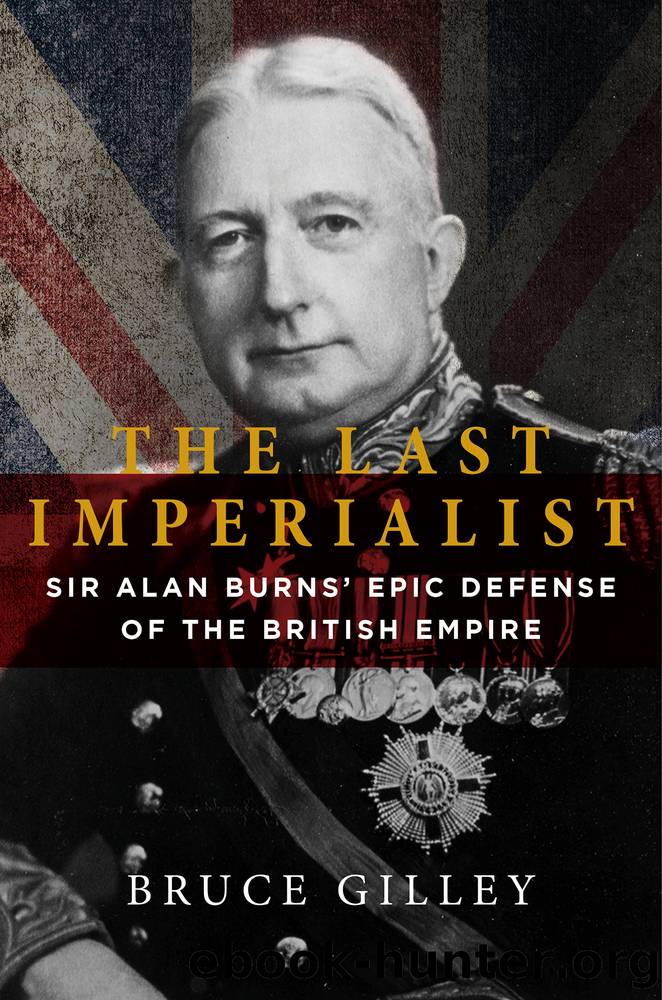The Last Imperialist by Bruce Gilley

Author:Bruce Gilley [Gilley, Bruce]
Language: eng
Format: epub
ISBN: 9781684512225
Publisher: Regnery Gateway
Published: 2021-09-21T00:00:00+00:00
* * *
Alan celebrated victory at the V-E parade in Accra in 1945 by donning his feathered and medaled gubernatorial costume made of heavy wool, âdesigned by the Colonial Office to kill off governors in the tropics,â as he joked. What did the future of colonialism look like to Sir Alan Burns as he paraded in his lethal finery? As with the last war, nothing would ever be the same. âThe lunacy of European wars, in which the white races have nearly succeeded in destroying their own civilization, has lost them, possibly forever, their scarcely questioned position of authority over the coloured world,â Alan would write.114 In addition to the carnage, the frequent appeals to liberty, democracy, and human rights by the Allies again redounded at home once the last shots were fired.115 The Anglo-American Atlantic Charter of 1941 insisted on âthe right of all peoples to choose the form of government under which they will live.â It was inevitable that large numbers of young men put into a liberal organization for an extended period would return home inspired by this promise of change. âThe war has generated new ideas and created a new sense of values throughout the world, and West Africa too has caught the spirit of the age,â one Ghanaian soldier wrote. Another who served in India, where independence talks were proceeding, recalled: âWe saw no reason why India should be granted independence and not our African colonies, because we didnât see much difference between India and Ghana.â116
As ever, colonialism begat nationalism which begat decolonization. It was a self-liquidating enterprise, and for those who took the long view, this had been the plan all along. One could not as a liberal country engage another area without that same liberalism seeping through. As Alan would write: âMany people believe that the clamour in British colonies for independence is proof of the failure of colonialism.⦠We believe it to be, on the contrary, an indication of the success of our policy, which was designed to make these people fit to govern themselves.â117
The international politics of colonialism had also shifted. The United States was willing to accede to the necessity of continued colonialism in the short-term if colonial powers promised political independence in the long term. The United States itself became a âcolonialâ power after the war with a mandate (now called a trusteeship) in the Pacific islands from the new United Nations. The rise of the Soviet Union as a Cold War rival also motivated Washington to support the colonial status quo. Yet this new international politicsâUN involvement and a superpower rivalryâalso posed problems for colonialism. If middle-class support for the colonial endeavor evaporated on the home front, then UN agitators would push for an acceleration of plans for independence while the United States, fearful of being outbid by Moscow, would throw its weight behind rapid decolonization. As Alan marched in full regalia across the parade ground in Accra that day in 1945ââthe grandiloquent boast of weak menââhis own doubts were on the rise.
Download
This site does not store any files on its server. We only index and link to content provided by other sites. Please contact the content providers to delete copyright contents if any and email us, we'll remove relevant links or contents immediately.
Machine Learning at Scale with H2O by Gregory Keys | David Whiting(4289)
Never by Ken Follett(3930)
Harry Potter and the Goblet Of Fire by J.K. Rowling(3842)
Unfinished: A Memoir by Priyanka Chopra Jonas(3370)
Fairy Tale by Stephen King(3366)
The Man Who Died Twice by Richard Osman(3065)
Will by Will Smith(2904)
Rationality by Steven Pinker(2348)
It Starts With Us (It Ends with Us #2) by Colleen Hoover(2332)
Can't Hurt Me: Master Your Mind and Defy the Odds - Clean Edition by David Goggins(2319)
The Dark Hours by Michael Connelly(2299)
The Storyteller by Dave Grohl(2224)
Friends, Lovers, and the Big Terrible Thing by Matthew Perry(2211)
The Dawn of Everything: A New History of Humanity by David Graeber & David Wengrow(2186)
The Becoming by Nora Roberts(2185)
The Stranger in the Lifeboat by Mitch Albom(2110)
Cloud Cuckoo Land by Anthony Doerr(2089)
Love on the Brain by Ali Hazelwood(2055)
Einstein: His Life and Universe by Walter Isaacson(2004)
